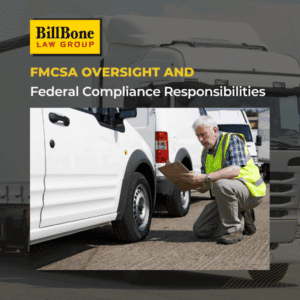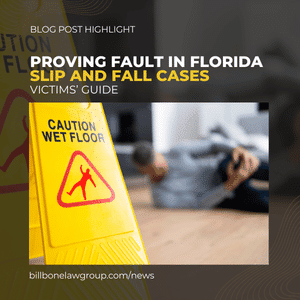How DOT regulation and truck driver liability impact accident claim? DOT regulations and truck driver liability play a critical role in understanding how these serious accidents occur and who may be held responsible.
Every year, thousands of vehicles share the major arteries of Palm Beach County, and with the dense traffic along I-95, the Florida Turnpike, and US-1, commercial trucks are a constant fixture.
The sheer size difference between an 80,000-pound semi-truck and a passenger vehicle means that a collision is often catastrophic, leading to devastating injuries or even death.
When one of these massive commercial vehicles is involved in a serious wreck in West Palm Beach, determining who is at fault is rarely simple. Often, the liability extends far beyond the truck driver and involves deep regulatory issues tied to the United States Department of Transportation (“DOT”).
At Bill Bone Law Group, we’ve represented victims of commercial truck accidents for decades. Our experienced attorneys understand that these cases require a meticulous investigation into not just the crash itself but also the driver’s history and the trucking company’s compliance with state and federal safety standards.
When DOT regulations are violated, it can provide powerful evidence of negligence, significantly impacting a personal injury claim.
You May Need This Article If:
- You or a loved one was injured in a commercial truck accident in West Palm Beach or Palm Beach County.
- You’re unsure who’s liable – the driver, the company, or another entity – and whether you can sue.
- A family member was killed or severely hurt in a tractor-trailer crash.
- You’re overwhelmed by insurance paperwork or have been denied a claim by a trucking insurer.
If you or someone you love has been injured in a commercial truck accident, you may be entitled to compensation under Florida law. The experienced attorneys at Bill Bone Law Group are ready to fight for your rights and pursue maximum recovery – call us today for a free consultation.
Navigating DOT Regulation and Truck Driver Liability
After a West Palm Beach Truck Accident
Commercial Truck Driver and Company Liability
In the context of a Florida personal injury claim, commercial truck driver liability refers to the legal and financial responsibility that a truck driver, and often their employer, bears for injuries and damages caused by their negligence or recklessness while operating a commercial motor vehicle.

This doctrine allows an injured party to hold the trucking company accountable, even if the company was not directly negligent.
Furthermore, when a truck driver or trucking company violates state or federal regulations, particularly those set by the Federal Motor Carrier Safety Administration (“FMCSA”), such as rules regarding hours of service, maintenance, or cargo loading), this violation can be a strong indicator of negligence or, in some cases, establish negligence per se – a legal principle where the violation of a safety statute or regulation automatically establishes a breach of duty.
This evidence is often crucial in proving that the driver or company breached a duty of care, which is a necessary step in establishing liability for the crash.
When one of these massive commercial vehicles is involved in a serious wreck in West Palm Beach, determining who is at fault is rarely simple. Often, the liability extends far beyond the truck driver and involves deep regulatory issues tied to the United States Department of Transportation (“DOT”).
How DOT Violations Happen in Palm Beach County
Major accidents involving commercial vehicles are an unfortunate reality across Palm Beach County’s high-traffic corridors. The volume of goods transported through South Florida – often using I-95 and the Turnpike as major North-South routes – means that thousands of commercial vehicles travel through West Palm Beach and Boca Raton every day.
The intense pressures often placed on the supply chain and commercial drivers can lead to critical safety breaches, particularly violations of federal rules established by the FMCSA.
Common DOT/FMCSA violations that we often investigate in Palm Beach County truck accident cases include:
Hours-of-Service (“HOS”) Violations
FMCSA rules strictly limit the time a driver can spend behind the wheel (usually 11 hours maximum after 10 consecutive hours off duty) to prevent driver fatigue. Companies that encourage or pressure drivers to violate this maximum-hour limit to meet deadlines are directly contributing to dangerous conditions on our roads.
 Driver Qualification Failures
Driver Qualification Failures
Drivers must hold a valid Commercial Driver’s License (“CDL”), be medically certified, and be proficient in English. Recently, fatal crashes in Florida have exposed systemic failures where drivers were operating with fraudulent or improperly issued CDLs, pointing to negligent hiring practices by the trucking companies.
Negligent Maintenance and Inspection
Federal regulations require trucks to undergo regular safety inspections and maintenance. Faulty brakes, worn-out tires, or non-functioning lighting – all maintenance issues that should have been caught during the mandatory pre- and post-trip inspections – are often direct causes or contributing factors in serious crashes.
Drug and Alcohol Use Violations
Commercial drivers in Florida are subject to mandatory drug and alcohol testing under FMCSA regulations.
In a personal injury case, an accident caused by a truck driver who is impaired not only constitutes a violation but can also be considered gross negligence due to the driver’s elevated professional duty to operate a potentially lethal commercial vehicle safely.
This level of misconduct can lead to increased liability and, in some cases, the imposition of punitive damages against both the driver and the trucking company.
When a driver or their employer violates these established safety rules, it often serves as powerful evidence that they breached their duty of care to other motorists on the road.
Proving a violation of these regulations often requires a professional investigation of the accident to secure electronic logging device (ELD) data before it is erased
FMCSA Oversight and Federal Compliance Responsibilities
The Federal Motor Carrier Safety Administration (FMCSA) plays a central role in promoting commercial motor vehicle safety and ensuring that carriers follow all applicable federal laws and safety regulations.
Every company authorized to operate commercial motor vehicles in the United States must maintain full DOT compliance, including adhering to strict guidelines governing driver qualifications, vehicle maintenance, and accurate record keeping.
These regulations cover essential areas such as drug and alcohol testing, weight limits, and the handling of hazardous materials, all designed to ensure safety and reduce the many truck accidents that occur each year.
During routine vehicle inspections and roadside inspections, FMCSA and state enforcement officers assess adherence to regulatory requirements by reviewing driver logs, inspecting cargo securement, and checking for potential service violations.
Companies are also subject to DOT audit procedures, where inspectors analyze maintenance files, electronic logging device data, and insurance documentation. Motor carriers must maintain specific minimum levels of public liability insurance, which covers bodily injury, property damage, and environmental restoration.
Failure to comply with DOT rules or engage in non compliance with inspection or reporting standards can have severe consequences. Fines for regulatory violations exceed billions annually for the transportation industry, and a carrier can lose its authority to participate in interstate commerce if it fails to meet federal law standards.
Ultimately, both drivers and companies must prioritize safety and uphold every aspect of ensuring compliance to maintain operational authority and public trust.
Can I File a Lawsuit in Florida for a Truck Accident?
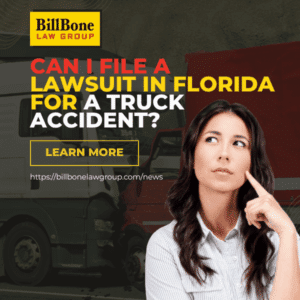
The statute of limitations for most personal injury claims in Florida, including truck accidents, is 2 years from the date of the accident.
If the accident resulted in a fatality, the deadline for filing a wrongful death claim is also generally 2 years from the date of death, not the date of the accident.
Missing this deadline means permanently forfeiting your right to seek compensation. Given the need for immediate, complex investigation, retaining a lawyer quickly is vital.
Investigating Violations and Assessing Trucking Liability
When investigating a truck collision, attorneys focus on assessing liability by reviewing the carrier’s adherence to regulations related to the trucking industry. The FMCSA collects and analyzes safety data—including crash reports, logbooks, and regulatory violations—to identify trends and uncover potential negligence.
Compliance with FMCSA standards is crucial when pursuing legal action, as these rules determine whether a truck owner or driver failed to meet established safety measures under state regulations or federal law.
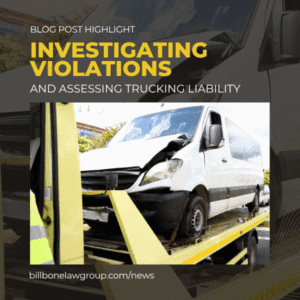
Drivers must undergo hours of training and pass a licensing exam to obtain a commercial driver’s license (CDL), and they are required to re-inspect cargo periodically during long hauls.
These procedures—along with pre-trip and post-trip vehicle inspections—are crucial to ensuring compliance and identifying potential hazards before they cause harm.
In serious crashes involving a large truck, issues like distracted driving, improper cargo loading, or failure to follow safety measures often reveal systemic problems within the carrier’s operation.
Trucking companies that fail to maintain proper records can incur heavy fines, lose their operating authority, and even face criminal or civil penalties. In court, juries may hold them accountable under theories of negligence per se or vicarious liability if there is a history of non compliance or repeated safety lapses.
By gathering FMCSA records, conducting roadside inspections, and reviewing electronic logging device data, lawyers can expose violations that strengthen the injured party’s claim and improve their chance of securing full and fair compensation.
Suing the Company – The “Deep Pocket”

- Vicarious Liability: Holding the company responsible for the negligent acts of their employee (the driver) under the dangerous instrumentality doctrine and the principle of respondeat superior.
- Negligent Hiring, Training, or Supervision: Holding the company liable for their own negligence if they hired an unqualified driver or failed to enforce DOT/FMCSA safety rules. Violations of DOT regulations, especially relating to driver qualifications or HOS logs, are key pieces of evidence for proving this company-level negligence.
What to Do Next
The period immediately following a truck accident is chaotic, but the actions you take can be critical to the success of your legal claim.
- Seek Immediate Medical Attention: Your health is the first priority. Document all injuries, symptoms, and treatments.
- Document the Scene: If you can safely do so, take photos of the truck (including company name and DOT number), the scene, and your vehicle’s damage.
- Notify Authorities: A police report is essential. In Florida, any crash involving a commercial motor vehicle must be reported to law enforcement.
- Preserve Evidence – Especially Medical and Financial Records: Keep everything: medical bills, lost wage statements, and all correspondence with insurance companies.
- Do Not Talk to Insurers Without Legal Counsel: The trucking company’s insurance adjusters and legal team will begin investigating immediately. Their priority is to minimize their payout. Do not give any recorded statements or sign any documents until you have consulted with a knowledgeable truck accident attorney. The evidence needed to prove a DOT violation – like driver logbooks and maintenance records – can be quickly lost or destroyed. You need a lawyer who can send a spoliation letter immediately to legally require the preservation of all evidence.
A truck accident is not like a standard car accident. It is a highly specialized area of law requiring a law firm that has the knowledge and resources to investigate DOT regulations, subpoena critical records, and take on major national trucking carriers and their insurance companies.
Ready to Speak With a West Palm Beach Truck Accident Lawyer?
Bill Bone Law Group has helped thousands of Florida injury victims seek justice and financial recovery, providing the legal guidance and compassionate support you need during a difficult time. Don’t face the trucking company’s legal team and insurance companies alone.
Contact us today for a free consultation and case review. Our attorneys have deep experience handling cases involving DOT regulation and truck driver liability.
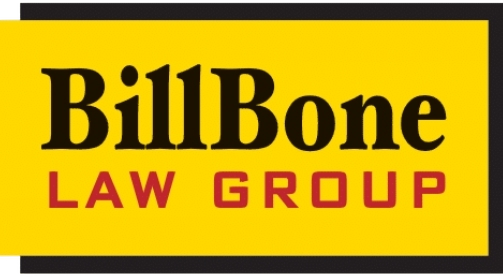
 Driver Qualification Failures
Driver Qualification Failures